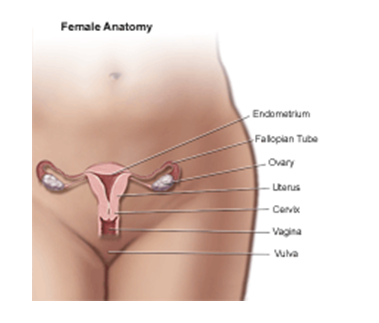The vagina is the passageway through which fluid passes out of the body during menstrual periods. It is also called the birth canal. The vagina connects the cervix (the opening of the womb, or uterus) and the vulva (the external genitalia).

Cancer of the vagina, a rare kind of cancer in women, is a disease in which malignant (cancer) cells are found in the tissues of the vagina.
There are several types of cancer of the vagina. The two most common are :
Squamous Cell Cancer (Squamous Carcinoma) :
Adenocarcinoma :
Other, Less Common Types of Cancer That can be Found in the Vagina Include :
Signs of Ovarian Cancer can Include :
The HPV vaccine can prevent the strains of HPV responsible for most cervical, Vaginal and vulvar cancers.
HPV vaccines can only be used to prevent certain types of HPV. They cannot be used to treat an existing HPV infection. To be most effective, one of the vaccines should be given before a person becomes sexually active.
The Following are the Most Common Symptoms of Vaginal Cancer. However, each Individual may Experience Symptoms Differently. Symptoms may Include :
Even if a woman has had a hysterectomy, she still has a chance of developing Vaginal Cancer . The symptoms of Vaginal Cancer may resemble other conditions or medical problems. Always consult a doctor for diagnosis.
It is very important that your particular findings be put into context by an expert. Gynecologic oncologists are subspecialists with advanced training in the diagnosis, treatment and surveillance of female cancers, including Vaginal Cancer .
Generally, There are Three Kinds of Treatment Available for Patients With Cancerous or Precancerous Conditions of the Vagina :
Surgery :
Radiation Therapy :
The use of X-rays, gamma rays and charged particles to fight cancer.
Chemotherapy (Topical) :
The use of anticancer drugs to treat cancerous cells.